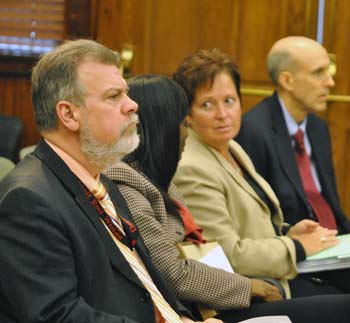Washtenaw County board of commissioners meeting (April 3, 2013): With a third of the board absent, commissioners were briefed on the county’s 2012 audit – with a look toward changes that will impact future financial statements. The audit was clean.

From left: Mark Kettner of the accounting firm Rehmann; Carla Sledge, Wayne County’s chief financial officer; Kelly Belknap, Washtenaw County’s finance director; and Pete Collinson, accounting manager for Washtenaw County. (Photos by the writer.)
The county’s finance staff, along with the auditor, Mark Kettner of Rehmann, highlighted several points, including a relatively dramatic increase in the general fund balance over the last few years – from $9.7 million in 2009 to $16.8 million at the end of 2012. Kettner also explained upcoming accounting changes that will require unfunded liabilities from the county’s pension and retirement healthcare plans – now totaling nearly $250 million – to be recorded in a different way, with more disclosure.
The new accounting changes – required by the Governmental Accounting Standards Board (GASB) – won’t begin until 2015, but commissioner Dan Smith (R-District 2) wondered whether the county could implement the changes sooner. It might be possible, Kettner replied, but “I don’t know why you’d want to do it.” He suggested that the board hold a working session to go over the upcoming changes in more detail.
Kettner also pointed out that the changes will affect government entities in different ways. For example, it’s likely that there will be more impact on the city of Ann Arbor, because of how its many “enterprise” funds might be affected and the implications that would have on outstanding bonds. At minimum, the changes will mean more work for finance staff.
Also at the April 3 meeting, commissioners voted to add 39 new jobs in the community support and treatment service (CSTS) department, which provides mental health and substance abuse services to county residents. The work is primarily funded by the Washtenaw Community Health Organization, a partnership between the county and the University of Michigan Health System. Most of the new jobs are union positions. Dan Smith expressed concern about adding to the county’s payroll, but supported the resolution along with other commissioners in a unanimous vote.
The board also took an initial vote to dissolve The Washtenaw Ride. That Act 196 authority is a remnant of a failed attempt to create a countywide transit system last year. Efforts to expand the current reach of the Ann Arbor Transportation Authority are still underway, but don’t require the structure that was put in place under Act 196.
The topic of public transportation was raised later in the meeting as well, as Ronnie Peterson (D-District 6) asked about the county’s role in the southeast regional transit authority (RTA). The RTA was formed by the state legislature last year to coordinate regional transit in the city of Detroit and counties of Wayne, Macomb, Oakland and Washtenaw. There was not uniform support for Washtenaw County to be part of this effort, and it’s not yet clear what the impact will be on the AATA.
In other discussion, Yousef Rabhi (D-District 8) highlighted a proposal in front of the Ann Arbor city council regarding possible ordinance changes governing the Ann Arbor Downtown Development Authority. Depending on what the council decides, there might be implications for the county, he said, so he wanted to put it on the board’s radar. For background on this issue, see Chronicle coverage: “DDA Tax Capture Change Gets Initial OK” and “DDA Ramps Up PR after First Council Vote.”
Also briefly mentioned was a discussion that occurred at a late March county pension commission meeting, raising questions about the new labor contracts that the board approved on March 20, 2013. At issue is whether the county complied with a state law requiring supplemental actuarial analysis before pension benefit changes are adopted. The county administration subsequently conferred with outside legal counsel, and confirmed their view that no new actuarial analysis was necessary.
And although it wasn’t discussed at the April 3 board meeting, the recent labor contracts resulted in another issue related to compliance with state law: Elimination of the county’s healthcare benefits for domestic partners. [Full Story]




